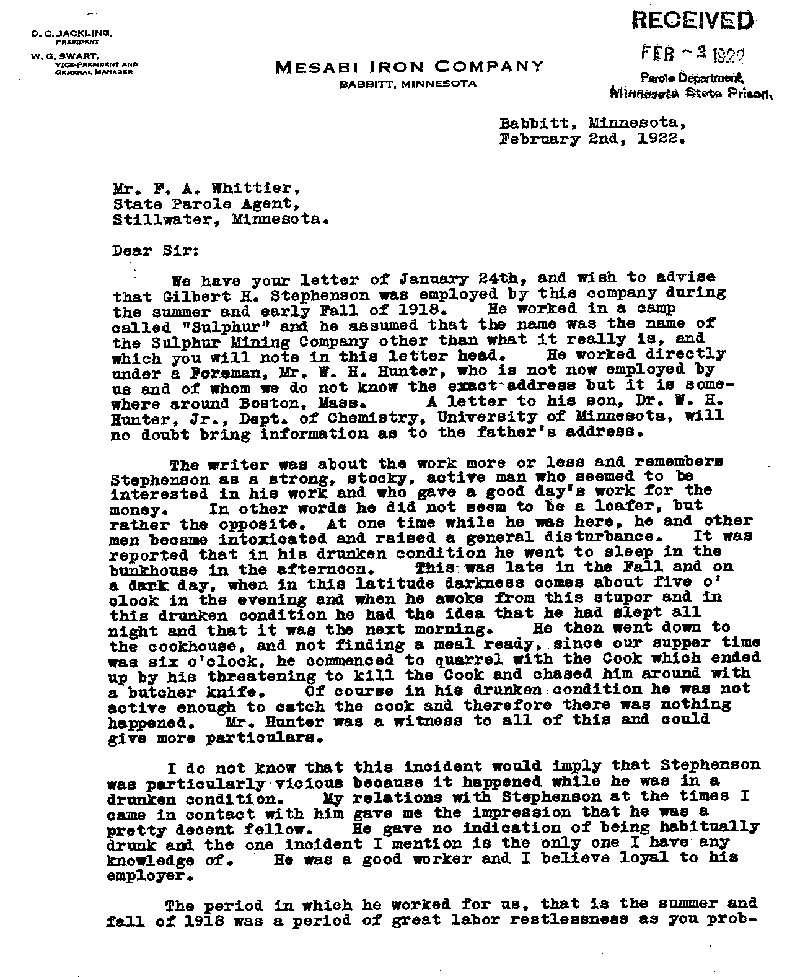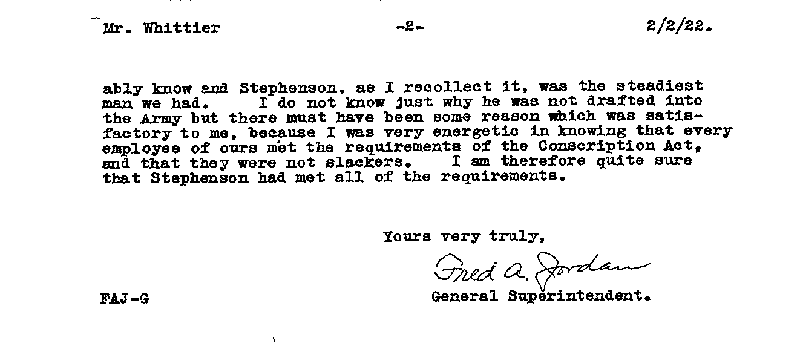Gilbert Henry Stephenson. Case No. 6598. Letter from Fred A. Jordan to Frank A. Whittier, February 2, 1922.
Type of event: Incarcerations
Location: Stillwater; Washington County; Minnesota; United States
Addressee: Frank A. Whittier
Addressor: Fred A. Jordan
Document date:
Document type: Correspondence
Citation:
Minnesota State Prison (Stillwater, Minn.) [Stillwater State Prison].
Gilbert Henry Stephenson: Case No. 6598.
Case Files.
Letter from Fred A. Jordan to Frank A. Whittier, February 2, 1922.
Image text
D. C. JACKLING,
PRESIDENT
W. G. SWART,
VICE-PRESIDENT AND
GENERAL MANAGER
MESABI IRON COMPANY
BABBITT, MINNESOTA
Babbitt, Minnesota,
February 2nd, 1922.
Mr. F. A. Whittier,
State
Parole Agent,
Stillwater, Minnesota.
Dear Sir:
We have your
letter of January 24th, and wish to advise that Gilbert H. Stephenson
was employed by this company during the summer and early Fall of 1918. He worked
in a camp called “Sulphur” and he assumed that the name was the name
of the Sulphur Mining Company other that what it really is, and which you will
not in this letter head. He worked directly under a Foreman, Mr. W. H. Hunter,
who is not now employed by us and of whom we do not know the exact address but
it is somewhere around Boston, Mass. A letter to his son, Dr. W. H. Hunter, Jr.,
Dept. of Chemistry, University of Minnesota, will no doubt bring information as
to the father’s address.
The writer was about the work more or
less and remembers Stephenson as a strong, stocky, active man who seemed to be
interested in his work and who gave a good day’s work for the money. In
other words he did not seem to be a loafer, but rather the opposite. At one time
while he was here, he and other men became intoxicated and raised a general
disturbance. It was reported that in his drunken condition he went to sleep in
the bunkhouse in the afternoon. This was late in the Fall and on a dark day,
when in this latitude darkness comes about five o’clock in the evening and
when he awoke from this stupor and in this drunken condition he had the idea
that he had slept all night and that it was the next morning. He then went down
to the cookhouse, and not finding a meal ready, since our supper time was six
o’clock, he commenced to quarrel with the Cook which ended up by his
threatening to kill the Cook and chased him around with a butcher knife. Of
course in his drunken condition he was not active enough to catch the cook and
therefore there was nothing happened. Mr. Hunter was a witness to all of this
and could give more particulars.
I do not know that this incident would
imply that Stephenson was particularly vicious because it happened while he was
in a drunken condition. My relations with Stephenson at the time I came in
contact with him gave me the impression that he was a pretty decent fellow. He
gave no indication of being habitually drunk and the one incident I mention is
the only one I have any knowledge of. He was a good worker and I believe loyal
to his employer.
The period in which he worked for us, that is the summer and fall of 1918 was a period of great labor restlessness as you prob-
Mr. Whittier -2- 2/2/22.
ably know and Stephenson, as I
recollect it, was the steadiest man we had. I do not know just why he was not
drafted into the Army but there must have been some reason which was
satisfactory to me, because I was very energetic in knowing that every employee
of ours met the requirements of the Conscription Act, and that they were not
slackers. I am therefore quite sure that Stephenson had met all of the
requirements.
Yours very truly,
Fred A.
Jordan
General Superintendent.
FAJ-G


